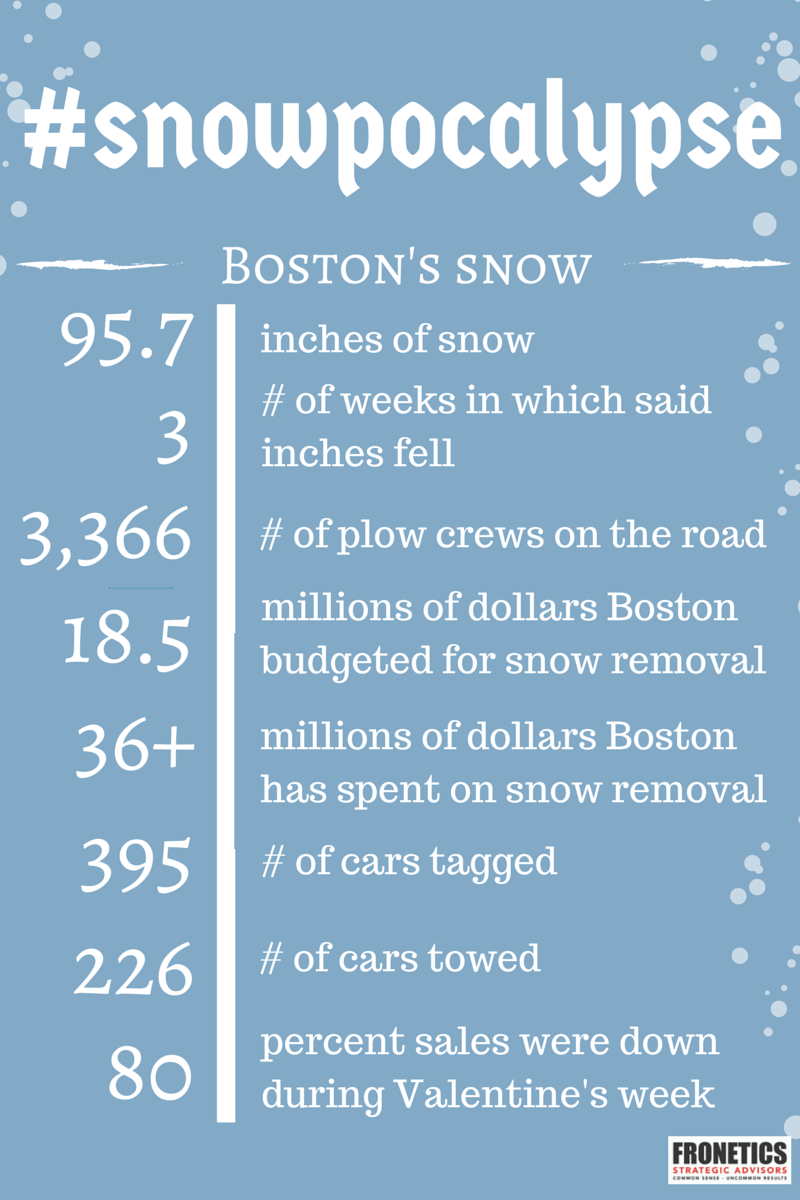![Boston’s snow logistics [Infographic]](https://fronetics.com/wp-content/uploads/2024/10/Boston-snow-logistics-800x675.png)
by Fronetics | Feb 17, 2015 | Blog, Current Events, Logistics, Strategy
The logistics of Boston’s snow #snowpocalypse
For the past three weeks we have been pretty much like this: shovel, snow blow, tackle commutes, juggle school cancellations, repeat.
Charlotte Wilder expressed the sentiments of many when she penned A Breakup Letter to Snow From the City of Boston. 95.7 inches of snow within 3 weeks is a lot of snow. The sheer amount of snow has forced the city’s public transportation to cancel operations. Schools have been cancelled, several for two weeks or more. Cars have been buried. Businesses have been forced to close. Businesses that have remained opened have realized dismal sales. Boston has opened snow farms and has purchased melting trucks. National Guard troops have been called in to help remove snow. #snowpocalypse 2015.

The snow has complicated the logistics of life. As we, individuals and businesses, complain about the economic, physical, and mental challenges associated with the snow it is important to put things into perspective. NPR’s Barbara Howard’s Blizzard of Perspective does just that.

by Fronetics | Feb 5, 2015 | Blog, Logistics, Strategy, Supply Chain

Think inbound marketing isn’t for the supply chain and logistics industries? Guess again. Here are 5 reasons companies in the supply chain and logistics industries need inbound marketing.
Companies within the supply chain and logistics industries tend to disregard inbound marketing. The reason being they do not think inbound marketing will prove successful. The common objection is that prospects and customers for these industries are not online.
The reality, however, is that inbound marketing can be wildly successful for companies within the supply chain and logistics industries.
Here are five reasons why companies in these industries should use inbound marketing:
1. Customers are online.
B2B buyers are online. 93% of B2B buyers report that they use search engines to research purchase decisions. These buyers go online for a number of reasons including to:
- Learn about new market developments and industry practices;
- Discover new solutions to address a specific problem;
- Address a project or a program being undertaken by their company.
2. 60% of the sales process takes place before they engage your sales rep.
The average customer progresses nearly 60% of the way through the purchase decision-making process before engaging with a sales rep.
Before engaging with a sales rep, customers are turning to the internet and to social media for information. The 2014 UPS B2B Buyers Insight Study found that 68% percent of buyers research supply purchases via supplier website, and 52% use search engines.
3. You can present solutions to your prospects’ problems via social media and content.
When prospects go online they are looking for information and for answers. By creating valuable content and leveraging social media you can attract and engage prospects, and convert these prospects to customers.
4. Inbound marketing is more effective than traditional marketing.
Research conducted by HubSpot found that inbound marketing is more effective than outbound marketing:
- 200% average ROI;
- 62% lower cost head;
- 15% increase in top line revenue.
5. The proof is in the pudding.
Freight logistics company Cerasis decided to make the switch from outbound marketing to inbound marketing. Within 25 months the company gained 98 new customers and increased revenue by 14%.
Fronetics Strategic Advisors is a management consulting firm with a focus on inbound marketing. We create and execute successful strategies for growth and value creation. Unlike other firms, our approach is data driven. We know ROI is important, so we track and measure results to drive success. Read about our approach to inbound marketing, or get in touch.


by Fronetics | Feb 5, 2015 | Blog, Logistics, Strategy, Supply Chain

Think inbound marketing isn’t for the supply chain and logistics industries? Guess again. Here are 5 reasons companies in the supply chain and logistics industries need inbound marketing.
Companies within the supply chain and logistics industries tend to disregard inbound marketing. The reason being they do not think inbound marketing will prove successful. The common objection is that prospects and customers for these industries are not online.
The reality, however, is that inbound marketing can be wildly successful for companies within the supply chain and logistics industries.
Here are five reasons why companies in these industries should use inbound marketing:
1. Customers are online.
B2B buyers are online. 93% of B2B buyers report that they use search engines to research purchase decisions. These buyers go online for a number of reasons including to:
- Learn about new market developments and industry practices;
- Discover new solutions to address a specific problem;
- Address a project or a program being undertaken by their company.
2. 60% of the sales process takes place before they engage your sales rep.
The average customer progresses nearly 60% of the way through the purchase decision-making process before engaging with a sales rep.
Before engaging with a sales rep, customers are turning to the internet and to social media for information. The 2014 UPS B2B Buyers Insight Study found that 68% percent of buyers research supply purchases via supplier website, and 52% use search engines.
3. You can present solutions to your prospects’ problems via social media and content.
When prospects go online they are looking for information and for answers. By creating valuable content and leveraging social media you can attract and engage prospects, and convert these prospects to customers.
4. Inbound marketing is more effective than traditional marketing.
Research conducted by HubSpot found that inbound marketing is more effective than outbound marketing:
- 200% average ROI;
- 62% lower cost head;
- 15% increase in top line revenue.
5. The proof is in the pudding.
Freight logistics company Cerasis decided to make the switch from outbound marketing to inbound marketing. Within 25 months the company gained 98 new customers and increased revenue by 14%.
Fronetics Strategic Advisors is a management consulting firm with a focus on inbound marketing. We create and execute successful strategies for growth and value creation. Unlike other firms, our approach is data driven. We know ROI is important, so we track and measure results to drive success. Read about our approach to inbound marketing, or get in touch.


by Fronetics | Jan 21, 2015 | Blog, Logistics, Strategy, Supply Chain

Share your experience with the use of content within the logistics and supply chain industries.
The amount of content on the internet is astounding, and it is growing by the second (check out One Second on the Internet). 93% of B2B companies are using content marketing and are thereby contributing to the increasing amount of content that is out there.
How do companies within the logistics and supply chain use content? What do companies see as the most effective methods of content creation and content distribution?
Fronetics Strategic Advisors is conducting a brief survey focused on the use of content within the logistics and supply chain industries. The survey will take less than five minutes to complete. All data collected will be used in aggregate and no identifying information will be shared or reported.
A report focused on the survey results will be published in March 2015.
Thank you in advance for your participation.


by Fronetics | Jan 21, 2015 | Blog, Logistics, Strategy, Supply Chain

Share your experience with the use of content within the logistics and supply chain industries.
The amount of content on the internet is astounding, and it is growing by the second (check out One Second on the Internet). 93% of B2B companies are using content marketing and are thereby contributing to the increasing amount of content that is out there.
How do companies within the logistics and supply chain use content? What do companies see as the most effective methods of content creation and content distribution?
Fronetics Strategic Advisors is conducting a brief survey focused on the use of content within the logistics and supply chain industries. The survey will take less than five minutes to complete. All data collected will be used in aggregate and no identifying information will be shared or reported.
A report focused on the survey results will be published in March 2015.
Thank you in advance for your participation.

![Boston’s snow logistics [Infographic]](https://fronetics.com/wp-content/uploads/2024/10/Boston-snow-logistics-800x675.png)







